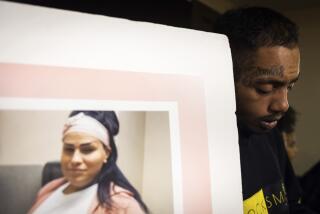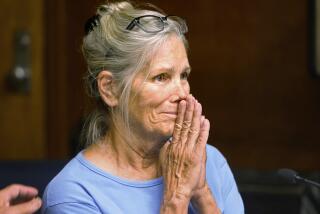Sara Jane Olson released to serve parole in Minnesota
- Share via
Culminating a case that has evoked history and strong emotions, former Symbionese Liberation Army member Sara Jane Olson was released from state prison Tuesday and cleared to serve supervised parole in Minnesota after completing a seven-year sentence for bank robbery and attempting to kill Los Angeles police officers.
Olson left the Central California Women’s Facility in Chowchilla shortly after midnight Tuesday and was taken by van to the Madera County parole office, where she was processed and released, said Terry Thornton, spokeswoman for the California Department of Corrections and Rehabilitation. She left with her husband, Thornton said.
David Nickerson, one of Olson’s attorneys, said he spoke briefly with his client, who expressed relief at being out of prison, but did not detail her immediate plans.
“She talked about what happened and how happy she was to be out,” Nickerson said.
Los Angeles police union officials, who mounted an eleventh-hour campaign to prevent Olson’s out-of-state parole, said they were “extremely disappointed” by the decision to allow her to go to Minnesota and criticized Gov. Arnold Schwarzenegger for not intervening in the case.
“We believe the governor should have used his discretion in this matter to ensure Olson stay under the watch of California authorities as she finished out her sentence,” said Paul M. Weber, president of the Los Angeles Police Protective League, which represents the LAPD’s 9,800 officers.
Olson was one of five SLA members -- including Emily Montague-Harris, William Taylor Harris, Michael Alexander Bortin and James William Kilgore -- who pleaded guilty in Sacramento County to second-degree murder in the death of Myrna Opsahl during the April 21, 1975, robbery of Crocker National Bank in suburban Carmichael.
Then known as Kathleen Soliah, Olson was inside the bank and armed at the time Opsahl, a 42-year-old mother of four, was fatally shot. The case took on added notoriety because kidnapped newspaper heiress Patricia Hearst said she was the getaway driver and described in a book how the robbery and killing took place. Hearst was not charged in that case, but served a two-year federal prison sentence for a San Francisco bank robbery.
In addition to the bank robbery, Olson admitted taking part in an August 1975 plan to place pipe bombs beneath LAPD police squad cars to avenge a shootout in South Los Angeles that left six SLA members dead. The bombs did not detonate, and in 1976 she was indicted by the Los Angeles County Grand Jury for trying to kill two LAPD officers.
By then, Olson had gone underground. She changed her name and eventually married a Midwestern emergency room physician and raised three daughters. She lived as a fugitive in Zimbabwe and St. Paul, Minn., where she was active in community theater and volunteer work for the blind.
But the refashioned soccer mom couldn’t escape her past. In June 16, 1999, she was arrested after police received tips about her identity from old acquaintances and viewers of the TV show “America’s Most Wanted,” which publicized a $20,000 FBI reward for her arrest.
Olson began serving a seven-year prison sentence in 2002. Her time behind bars was uneventful until March 2008, when, because of a clerical error, she was released a year early. She was promptly rearrested as she prepared to fly home to Minnesota to serve supervised parole.
In the lead-up to her release Tuesday, the Police Protective League again made her parole to Minnesota an issue, arguing that California had a greater interest in seeing Olson abide by the conditions set out by state corrections authorities.
Minnesota Gov. Tim Pawlenty even wrote Schwarzenegger in an effort to keep Olson in California.
Legal experts and her lawyers argued that she had served her sentence and that she would better adjust to civilian life where she had a strong support network.
“Minneapolis is where she lived for decades,” Nickerson said. “It would make absolutely no sense to parole her anywhere else.”
--
andrew.blankstein @latimes.com
More to Read
Sign up for Essential California
The most important California stories and recommendations in your inbox every morning.
You may occasionally receive promotional content from the Los Angeles Times.













